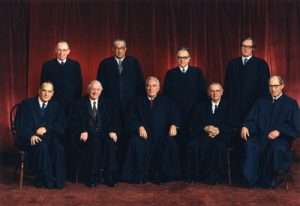The Volokh Conspiracy
Mostly law professors | Sometimes contrarian | Often libertarian | Always independent
Today in Supreme Court History: October 11, 1972
10/11/1972: Roe v. Wade argued.

Editor's Note: We invite comments and request that they be civil and on-topic. We do not moderate or assume any responsibility for comments, which are owned by the readers who post them. Comments do not represent the views of Reason.com or Reason Foundation. We reserve the right to delete any comment for any reason at any time. Comments may only be edited within 5 minutes of posting. Report abuses.
Please to post comments


Arlington County Board v. Richards, 434 U.S. 5 (decided October 11, 1977): community can restrict on-street parking to residents and their guests; "rational basis" survives Equal Protection attack (at first I got this confused with the Arlington zoning case from the same year, but this case didn't seem to be about race; issue was avoiding congestion and pollution)
Ex parte Levitt, 302 U.S. 633 (decided October 11, 1937): someone sued to invalidate Hugo Black's appointment to the Court on the basis that he was already a Senator (in violation of art. I, 6, clause 2) (I don't know why anyone would argue this; he resigned as Senator the day he was confirmed); dismissed for lack of standing (does this mean nobody can contest a S.Ct. appointment?) (the opinion was "Per Curiam" and no note about Black recusing himself)
Oklahoma v. Texas, 272 U.S. 21 (decided October 11, 1926): original jurisdiction case; dispute over a chunk of land bigger than Rhode Island next to southwest corner of Oklahoma (not the panhandle) resolved by looking at the "true 100th meridian" where it intersects with the South Fork of the Red River, and not where bumbling surveyors had declared it to be, even if previously acquiesced in (look at modern map and you see the border wiggles to the south and north of the river, mostly south, to Oklahoma's benefit; is this due to accretion/erosion?)
A little surprised by Oklahoma v. Texas since that dispute was decided earlier in the 1896 case United States v. State of Texas. I wonder how it came back again.
The earlier case (Oklahoma wasn’t a state yet, so it was the federal government vs. Texas) had made some determinations which were overruled by the case I summarized due to later developments.
Ex Parte Levitt: possibly a Senator could? Although this may have been because the Senate gets to decide if the appointment was valid.
Section 6, clause 2 provides:
The first subclause is the Ineligibility Clause; the second is the Incompatibility Clause. The issue in Levitt was whether, under the Ineligibility Clause, the emoluments for Supreme Court justices had been increased during Black's "time for which he was elected".
Black was first elected to the Senate in 1926, then re-elected in 1932 to a term that would have expired on January 3, 1939. In 1937, Congress created a new retirement option for Supreme Court justices whereby they could retire at full salary. Now, had there previously been no pension, I think this would clearly have been an increased "emolument", rendering Black ineligible to serve on the Court until 1939, but, naturally, it was a bit more complicated. Previously, a 70-year-old Justice could resign at full salary, but not retire. The distinction is meaningful, because a resigned Justice, unlike a retired one, is no longer an Article III judge, so he no longer retains the Constitutional protection that his “[c]ompensation . . . shall not be diminished during their Continuance in Office.” Booth v. United States, 291 U.S. 339 (1934). So, Congress could reduce, or even eliminate, the pension of an Article III judge who had resigned, but not one who had retired.
So, had Black been ineligible at the time of his appointment? I think a reasonable argument could be made either way.
An interesting issue under the companion Incompatibility Clause is whether a member of Congress is entitled to simultaneously hold a reserve commission in the armed forces. The D.C. District Court, in a decision affirmed by the D.C. Circuit, held they were not. Reservists Comm. to Stop the War v. Laird, 323 F. Supp. 833 (D.D.C. 1971); affirmed, 495 F.2d 1075 (D.C. Cir. 1972). A 6-3 Supreme Court, citing Levitt dismissed the case, holding the plaintiffs lacked standing. Schlesinger v. Reservists Comm. to Stop the War, 418 U.S. 208 (1974).
Thanks! Maybe that was the argument being made. (Though Black should still have recused himself.)
Could anyone help me find the Volokh Conspirators (and maybe a frequent commenter or two) on this poster? I can't seem to pick 'em out of that illustrious crowd . . . but I know they are there!
Thank you.
I see the Pillow Guy will be there.
Maybe he can open a concession stand and sell MAGA pillows!
Are there really enough downscale, backwater rubes willing to pay top dollar for mediocre pillows, sheets, and slippers (with or without the predictable bogus health claims) to make this guy wealthy enough to satisfy an eight- or nine-figure defamation judgment?
I recognize that Costco (praise to all things Kirkland) is inconvenient or inaccessible for some Americans, but is it genuinely that difficult to reach a Target, Walmart, or Kohl's? Maybe load up the horseless carriage and make a day of it once a while to buy modern provisions? Wouldn't Dollar General stock pillows if there were that much demand for down-market pillows?
My theory is that the man has separation issues. Maybe his mother took his favorite pillow from him when he was a child (or his wife did, when he was 35).
Does the Federal Government have sole jurisdiction to pursue such crimes under applicable federal law? Or are these offenses subject to concurrent prosecution by the federal and state governments? slope unblocked mapquest driving directions